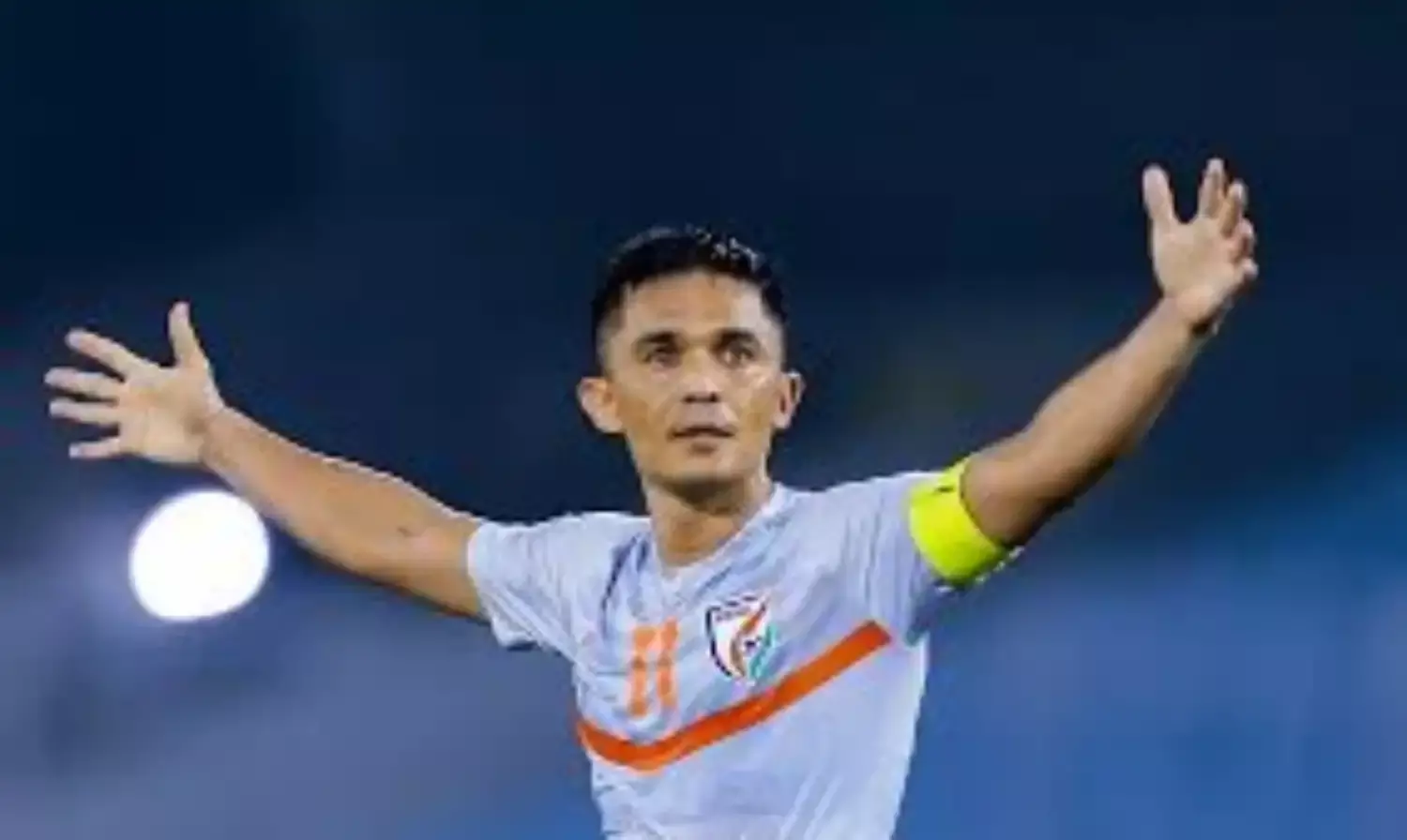Sunil Chhetri’s Retirement Will Change Indian Football
Swansong match on June 6

He has been the one silver lining in the inky dark cloud that is Indian football. Through the years even as Indian football plumbed new depths, it is at an all-time low of 121 in the latest FIFA rankings, Sunil Chhetri ploughed a lonely furrow being a veritable beacon of dedication and excellence.
Indian football will not be the same after June 6 when he plays his swansong match against Kuwait in the World Cup qualifier at the Salt Lake stadium in Kolkata. Indeed one is already dreading as to what further depths the Indian team will sink to without the talismanic figure that Chhetri has been all these years to guide and inspire it.
It is interesting to note that despite coming from a family with a background in football the sport was not close to Chhetri’s heart during his teenage years. He only looked at it as a means to gain entry to Delhi’s St Stephen’s college through the sports quota to further his education.
Chhetri was not aware that he was destined for greater things in the beautiful game but his father Kharga Chhetri had an inkling. Football ran in the family as the senior Chhetri represented the Indian Army and his wife had played for Nepal’s national team along with her sisters.
As he nursed a dream to see his son become a professional footballer and achieve what he couldn't, Chhetri's career started to take shape in the national Capital as he represented City Club, Delhi in 2001-02. Then came his real big break as Indian football heavyweights Mohun Bagan enamoured by his skills with the ball signed him up in 2002. The rest, as the cliché goes, is history.
Chhetri made his India debut against Pakistan in Quetta in 2005 and over the next two decades became the country’s most famous face when it came to football and also among the most renowned Indian sportsmen. He has been bestowed with the Arjuna award in 2011, Padma Shri in 2019, Dhyan Chand Khel Ratna in 2021 (the only footballer to win it) and the Asian Icon by the AFC in 2018. He was adjudged the AIFF Player of the year an unprecedented seven times.
For almost 20 years Chhetri was the most sought-after player by the clubs and he represented Mohun Bagan, East Bengal, Dempo, Chirag United, Churchill Brothers, Bengaluru FC and Mumbai City FC besides playing for Kansas City Wizards in the United States and Sporting CPB in Portugal.
A striker who found the net with unerring accuracy thanks to his speed, skill and ethereal ball play, Chhetri was the first to score 50 goals for India in internationals. But that was no benchmark for him.
He surged ahead and with 94 international goals he is only behind Cristiano Ronaldo (128) and Lionel Messi (106) among active players. Among all the stats and awards and trophies this fact alone is enough to confirm his stature as a living legend. Having figured in 150 matches, Chhetri is also the most capped Indian player.
The Secunderabad-born Chhetri, who turns 40 in August, will walk into the international sunset after rendering yeoman service of two decades to a team that was heavily reliant on the 5’ 7” forward to deliver the goods. For its longevity and consistency, this has been an unparalleled career.
Among his major successes Chhetri helped India win the Nehru Cup in 2007, 2009 and 2012 and the South Asian Football Federation (SAFF) championship in 2011, 2015, 2021 and 2023. He also played a notable role in India’s 2008 AFC Challenge Cup win which helped the nation to qualify for its first AFC Asian Cup in 27 years. He went on to represent India at two more editions of the competition in 2019 and 2023.
Despite becoming the heartbeat of Indian football Chhetri remained a low-key personality living up to his reputation as a ‘prankster’ which he had been since his teenage days. Things however changed for him when he was handed over the captain’s armband by then head coach Bob Houghton after Bhaichung Bhutia’s retirement from international football following the Asian Cup in 2011.
His role thereafter was not restricted to finding the back of the net. Despite increasing expectations and the pressures of being the captain he had little trouble in leading from the front inspiring his teammates with adroit ball play and defence splitting passes.
Though he frequently did not have enough support, Chhetri performed with aplomb. He was aware that he would have to rise to the occasion in the absence of the ‘Sikkimese Sniper’ as Bhutia was known and went on to lead India in 87 matches.
His childhood coach Mohammed Sajid probably spoke for everyone when he said that India does not have a player to replace Chhetri. “No, I don’t see any player right now to replace Sunil. Maybe in the future, yes, but right now there is no one,’’ Sajid said, adding that he would like Chhetri to step into the world of football administration.
Whether it will be administration or coaching one thing is sure. Chhetri will continue to be associated with football. He loves the beautiful game too much to give it up altogether. The several sincere and handsome tributes paid to him - led by FIFA - following his announcement stand as a testimony to his singular contribution to Indian football. His real worth will be known only now when the team takes the field without the “diminutive dynamo’’ around.



